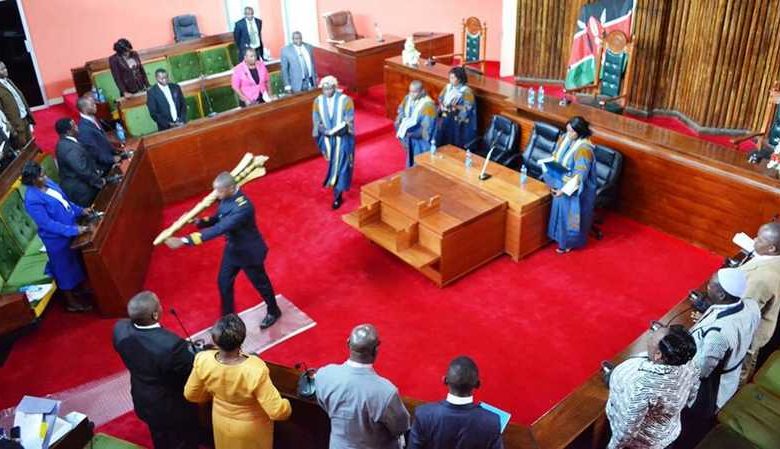County Assembly

The citizens of any county can turn to their elected County assembly member if for instance, the promised road in their ward has not been built. But this is the task of the County government, not the assembly. The county assembly, however, is in charge of budget making, oversight over the County government, law making for the county and representation of the will of voters of the whole county. The funtions are laid out in the Fourth Schedule of the Constitution.
Roles of the County Assembly
- The county assembly vets and approves nominees to hold county public offices. These include the County Executive Committee Members, members of the County Assembly Service Board (CPSB) and Chief Officers who head county departments. All these are nominated by the governor who then appoints them after approval by the Assembly. The County Assembly also approves the apointment of its own clerk, the County Assembly Clerk.
- It has the power to make (and amend) county laws (Article 185). The Constitution gives the assembly authority to exercise this power. The assembly makes these laws to enable the county governments work effectively. However, it should not directly interfere in the functions of the county executive.
- The county assembly receives and approves plans and policies for the management and exploitation of the county’s resources, and development and management of its infrastructure and institutions.
- The assembly approves the budget and expenditure for the county government. It has the final say on the allocation to various sectors and expenditure for the county government. It authorizes the county executive to withdraw money from the county exchequer account at the Central Bank (Article 207) by passing a law authorizing that withdrawal (Appropriations Act).
- The county assembly should also interrogate county audit reports by the Auditor General and the quarterly budget implementation reports by the county executive. It should give recommendations that are binding to the county executive.
- In its oversight work, the county assembly has the authority to summon any county official (except the governor) to appear before it or its committees for purposes of providing evidence or information.
- It approves any borrowing by the county government (Article 212) whether internally (e.g. from commercial banks) or externally (from multinational corporations).
- The assembly should approve the county development planning established by the county executive (County Governments Act Part XI). These plans include the CIDP.
Committees
The County Assembly operates through various committees such as the Public Accounts and Investment committee, the Budget and Appropriations committee and the Finance and Economic Planning committee.
Composition of the County Assembly
Article 176 of the Constitution states the composition of a county government as comprising of a County Assembly and a County Executive.
1) A county assembly consists of-
(a) members elected by the registered voters of the wards, each ward constituting a single member constituency, on the same day as a general election of Members of Parliament, being the second Tuesday in August, in every fifth year;
(b) the number of special seat members necessary to ensure that no more than two-thirds of the membership of the assembly are of the same gender;
(c) the number of members of marginalized groups, including persons with disabilities and the youth, prescribed by an Act of Parliament; and
(d) the Speaker, who is an ex officio member.
(2) The members contemplated in clause (1) (b) and (c) shall, in each case, be nominated by political parties in proportion to the seats received in that election in that county by each political party under paragraph (a) in accordance with Article 90.
(3) The filling of special seats under clause (1) (b) shall be determined after declaration of elected members from each ward.
(4) A county assembly is elected for a term of five years.
Currently, there are 1450 elected MCAs and 772 nominated MCAs bringing the total number to 2,222 MCAs.
Role of members of the county assembly (MCAs)
Section 9 of the County Governments Act says a member of a county assembly shall—
(a) maintain close contact with the electorate and consult them on issues before or under discussion in the county assembly
(b) present views, opinions and proposals of the electorate to the county assembly
(c) attend sessions of the county assembly and its committees
(d) provide a linkage between the county assembly and the electorate on public service delivery
(e) extend professional knowledge, experience or specialised knowledge to any issue for discussion in the county assembly.
A member of the county assembly shall not be directly or indirectly involved in the—
(a) executive functions of the county government and its administration; or
(b) delivery of services as if the member were an officer or employee of the county government.
Recall of MCAs
The electorate in a county ward may recall their member of the county assembly before the end of the term of the member and after twenty four months after their election into office under Section 27 of the The County Governments Act, 2012. The recall can be made if the member is found, after due process of the law, to have violated the provisions of Chapter Six of the Constitution; have mismanaged public resources; or is convicted of an offence under the Elections Act (No. 24 of 2011).
Guiding questions for journalists
- Do the MCAs have the capacity to perform their duties as outlined in the Constitution?
- Are they independent in carrying out their functions?
- How are the roles of the assembly different from those of the executive? Are the MCAs directly interfering in county executive functions, e.g. in management or implementation of funds?
- What is the role of the county assembly in the budget process? Is it perfoming this role well?
- How and why should you recall an MCA?
- What to do about all this as the media?